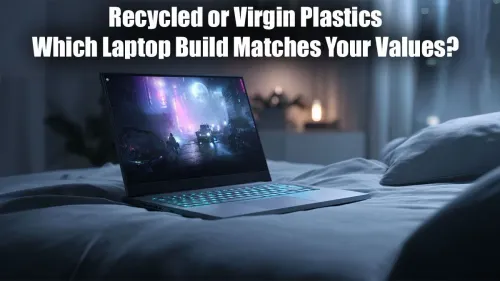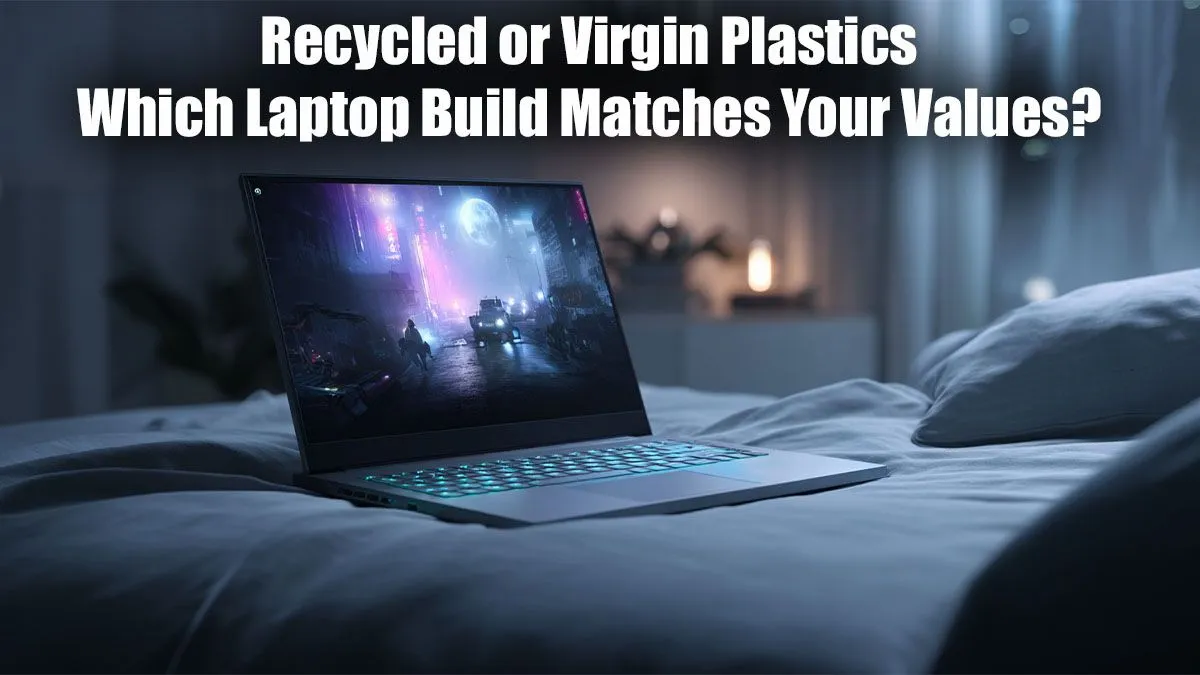
Recycled Plastics vs Virgin Plastics in Laptops: Eco-Choices
Ever wondered if your laptop uses recycled or virgin plastics? 🌱 Discover how your tech choice impacts the planet. Make informed eco-friendly decisions today!
Ever wondered if your laptop uses recycled or virgin plastics? 🌱 Discover how your tech choice impacts the planet. Make informed eco-friendly decisions today!

Hey, South African tech enthusiasts and gamers! Ever found yourself eyeing that sleek new laptop, pondering its power, its price, and maybe... its environmental footprint? In a world where every click counts, our choices extend beyond just specs. Today, we’re diving into a crucial, often overlooked aspect of laptop manufacturing: the battle of recycled plastics vs virgin plastics in laptops. Can your next upgrade be both high-performance and a nod to sustainability? Let’s unpack the eco-choices available. ✨
When we talk about laptop casings, internal components, and even packaging, plastics are everywhere. But not all plastics are created equal.
Virgin plastics are derived directly from raw, unrefined fossil fuels like crude oil and natural gas. They offer consistent quality, predictable performance, and are often the go-to for manufacturers due to their ease of processing and readily available supply. Think of them as the "fresh ingredients" of the manufacturing world.
Recycled plastics in laptops, on the other hand, are materials that have been reprocessed from existing plastic waste. This could be post-consumer waste (like water bottles or packaging) or post-industrial waste (scraps from manufacturing processes). The goal is to reduce the demand for new fossil fuels, lessen landfill waste, and cut down on energy consumption during production. It's about giving plastic a second, useful life. ♻️
Choosing between recycled plastics vs virgin plastics in laptops isn't just an abstract environmental debate; it has tangible impacts.
From an environmental perspective, the benefits of using recycled materials are compelling:
However, there are often perceived trade-offs. Some worry about the durability or aesthetic quality of recycled materials. Historically, achieving the same consistent finish or structural integrity with recycled content could be challenging. Yet, advancements in material science mean many modern laptops incorporating recycled plastics meet the same rigorous quality standards as their virgin plastic counterparts.
Look for certifications like EPEAT (Electronic Product Environmental Assessment Tool) or Energy Star when browsing laptops. These labels often indicate a product’s commitment to environmental performance, including the use of recycled materials.
For South African gamers and professionals, performance is non-negotiable. The good news? You no longer have to sacrifice raw power for eco-conscious design. Many leading brands are integrating recycled plastics into their high-performance machines, proving that sustainability and cutting-edge technology can coexist.
When you're looking for your next powerhouse, whether it’s for intense gaming sessions or demanding work tasks, consider the brands making these strides. You might find a fantastic deal on a laptop that not only crushes benchmarks but also has a smaller environmental footprint. For example, exploring the latest laptop specials for sale in South Africa at Evetech could reveal options that blend both aspects beautifully.
The trend towards more sustainable materials is only accelerating. Manufacturers are investing heavily in research and development to improve the quality, availability, and versatility of recycled plastics in laptops. This includes exploring ocean-bound plastics, bio-based plastics, and closed-loop recycling systems where old laptops can be directly recycled into new ones. It’s an exciting time for tech, where innovation isn't just about faster processors, but also about smarter, more responsible production.
For those chasing the ultimate gaming experience, remember that a powerful rig doesn't have to come at the planet's expense. Whether you're eyeing the best gaming laptop deals or checking out specific platforms, many options now feature thoughtful material choices.
Ultimately, the choice between recycled plastics vs virgin plastics in laptops often comes down to personal priorities and available options. But by being informed, you empower yourself to make a decision that aligns with your values. As consumers, our demand for sustainable products drives manufacturers to innovate and adopt greener practices.
Whether you're loyal to team AMD laptops on special or prefer the robust performance of Intel laptops on special, take a moment to consider the materials used. Every small step towards sustainability contributes to a larger, healthier planet for all of us. Let's make eco-choices that count, without compromising on the tech we love. 🚀
Upgrade Responsibly, Perform Powerfully Ready to find a laptop that aligns with both your performance needs and your eco-conscious values? Explore Evetech's extensive range of laptops today and discover cutting-edge technology designed for a smarter future. Shop now at Evetech for performance that leaves lag in the dust.
Recycled plastics reduce waste but may compromise durability. Virgin plastic offers consistency but increases fossil fuel demand.
Yes! Brands like HP, Dell, and Apple use post-consumer recycled plastics in their laptop casings.
Visit the manufacturer's sustainability page or look for product labels highlighting recycled materials.
Virgin plastic requires new petroleum resources, contributing to pollution and climate change.
Sometimes marginally, but ethical materials often align with long-term savings and values-driven tech.
Some models use up to 100% recycled plastics, but industry averages vary by brand and product line.
Advances improve performance, though certain high-stress areas still use virgin materials.